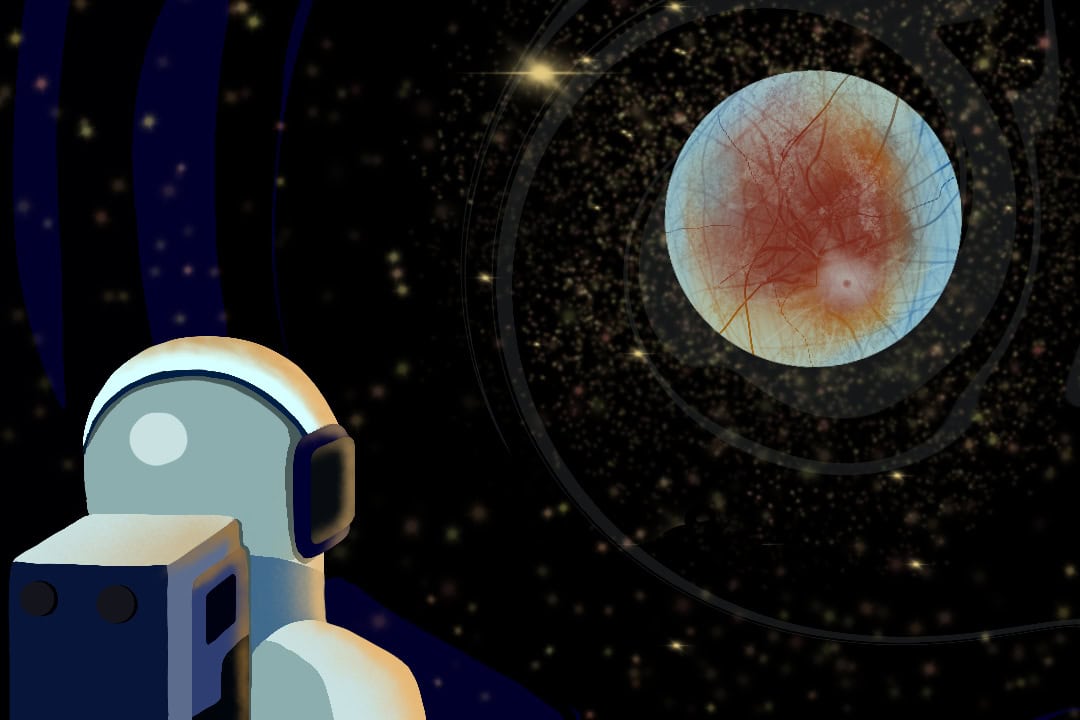“Compared to the breadth of knowledge yet to be known, does your life actually matter?”
This last line spoken by the fictional character Rosa Dasque (Anamarina Marinca) in the 2013 film Europa Report, epitomizes the film’s message of how little we really know about the universe. Dasque is the pilot and archivist on the Europa One spacecraft that carries a crew of six astronauts for an exploratory mission to Europa — one of Jupiter’s four largest moons.
Europa One’s mission, funded by a fictional private space travel enterprise, explores the geological terrain of Europa, and the possibility of simple life forms — such as single-celled microbes or bacteria — hidden beneath the moon’s ice-crusted ocean, which is twice the size of Earth’s.
At their departure, the astronauts are optimistic about pushing the boundaries of knowledge. However, they are unaware that a series of technical failures, human errors, and the utter unfamiliarity of the cosmic environment will gradually eliminate the bright-eyed and expectant crew, one by one. In this way, the film carries undertones of sci-fi noir.
Inspired by reality, theorized by fiction
Well-received by audiences and the scientific community, Europa Report stands out for its attention to detail. The film features multiple camera angles that mimic those used in the space station and shuttle, technologies designed to monitor crew activities and the environment without visual cues, and the analysis of cosmic samples based on their chemical composition. Additionally, Europa’s surface shots are based on actual maps from NASA and the Jet Propulsion Laboratory.
Europa Report’s scientific validity also keeps its technical failures — central to the plot — from descending into sci-fi thriller clichés. For example, the heat plume that threw the spacecraft off its calculated landing point, hindering optical surface analysis and motivating the botched spacewalk, resulted from the thermal activity of the ocean beneath Europa’s surface.
The movie’s technical validity stems from the production team’s conviction that holding themselves accountable to realism is essential for creating great drama. In fact, producer Sebastián Cordero and director Ben Misher stated that increasing the film’s budget would have made little difference in the final outcome, emphasizing that “great creativity comes out of constraints.”
And where there’s water, there’s life. Life beyond Earth — known as astrobiology — continues to engage humanity’s curiosity and imagination due to its relevance to our existence. It raises philosophical questions: Where do we come from, and what is our place in the vast emptiness of space? Europa Report was inspired by a series of astronomical excursions to Jupiter’s moons and the broader solar system, which collected promising evidence that Europa’s atmospheric conditions and geology could potentially harbour life.
Starting in the late 1990s, evidence for water on Europa emerged from NASA’s Galileo spacecraft, which discovered an induced magnetic field indicative of an ocean while orbiting around Jupiter. In 2012 — around the time the movie was filmed — the Hubble Space Telescope observed signs of plumes — eruption of vaporized water into space — later confirmed by reanalyzing images from Galileo. This water vapour, directly detected at Europa’s surface in 2019, supports the hypothesis of an ocean beneath the ice. The same plumes are integral to the film’s plot, where thermal activity beneath Europa’s surface throws the spacecraft off its landing point.
As the lines between science fiction and reality blur…
The world of sci-fi — along with the scientific and cultural enthusiasm that it evokes — has long inspired real scientific leaps, including the landing site for the 2020 Perseverance Rover, which is currently exploring Mars in search for fossilized microbes.
Meanwhile, the NASA-developed space probe Europa Clipper, is set to be launched, utilizing an ice-penetrating radar that scans for liquid water — similar to the probe depicted in Europa Report. This is not the first time sci-fi has influenced the trajectories of science; from the development of virtual reality and avatars inspired by the cyberpunk precursor novel Neuromancer to questions of artificial intelligence safety and ethics raised in 2001: A Space Odyssey, sci-fi has long shaped scientific exploration.
Another way Europa Report serves as a blueprint for the future is through its idealization of science and international collaboration, reflected in the cultural diversity of the crew. However, this representation is overly optimistic given the realities of scientific elitism — where scientific advancement is prioritized within a privileged few — and the unequal access to future space travel across different social classes, both of which remain unresolved social issues.
As the film nears its end, audiences realize that when Europa One lost contact with Earth during a solar storm, it left the crew isolated in space, sealing their doom. Staying true to their scientific mission, the crew chooses to press on despite the setbacks, but the mission gradually devolves into a journey of no return.
Through it all, one must ask: at what cost are we willing to uncover the secrets of the universe, given that knowledge is a fundamentally human construct? Regardless of the answer, we cannot help but admire the ambition behind such scientific pursuits. With the freedom to determine the value of our knowledge in our hands, the scientists in Europa Report, driven by a quest that transcends individual existence, lived their lives to the fullest until the very end.



No comments to display.